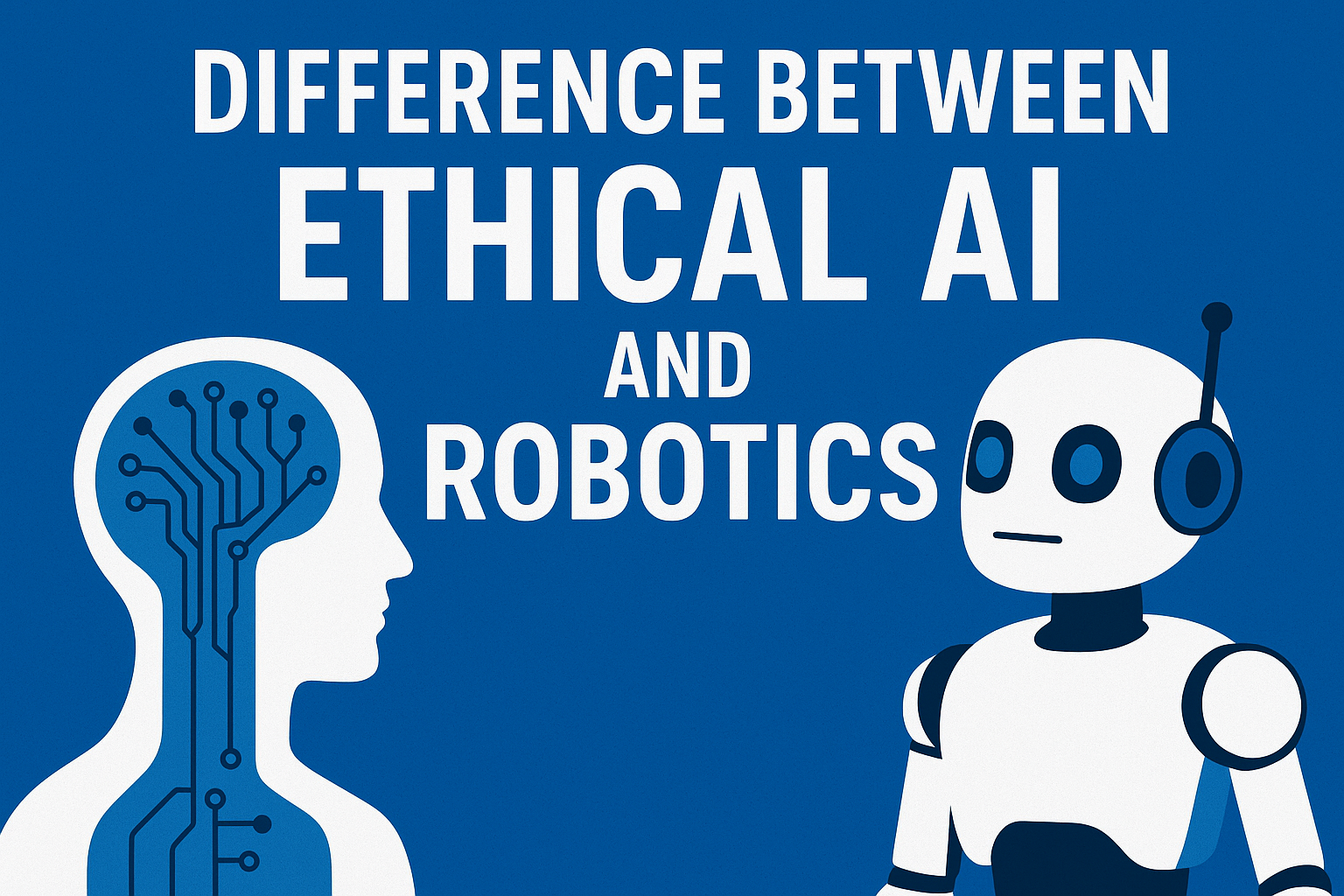Difference Between Ethical AI and Robotics
The difference between Ethical AI and Robotics is a subject that has become increasingly relevant in today’s fast-paced technological era. While Artificial Intelligence (AI) and robotics are often discussed together, they are not the same thing. Ethical AI deals with moral, legal, and responsible decision-making by intelligent systems, while robotics is about building physical machines that perform tasks. Together, they intersect but represent two unique branches of technology with distinct challenges and applications.
What is Ethical AI?
Ethical AI refers to the development and deployment of artificial intelligence systems that adhere to human values, fairness, transparency, and accountability. Unlike regular AI, which focuses only on functionality and performance, Ethical AI ensures that the algorithms are not biased, that they respect user privacy, and that they do not cause harm.
For example, an AI tool used in hiring must not discriminate against candidates based on gender, race, or background. Ethical AI frameworks exist to make sure such decisions remain fair and justifiable.
What is Robotics?
Robotics, on the other hand, is the branch of engineering and science that deals with designing, building, and operating physical machines (robots). Robots can be simple automated arms used in manufacturing or complex humanoids designed to mimic human behavior.
The primary focus of robotics is physical performance—such as speed, precision, durability, and strength. Robots may or may not use AI. A robotic vacuum cleaner, for instance, may use basic sensors without complex decision-making, while advanced robots in healthcare may integrate AI to assist surgeries.
Core Difference Between Ethical AI and Robotics
| Aspect | Ethical AI | Robotics |
|---|---|---|
| Definition | Moral and responsible use of AI technologies | Designing and building physical robots |
| Focus | Fairness, transparency, safety, accountability | Physical tasks, automation, durability |
| Form | Software-based systems and algorithms | Hardware-based machines |
| Key Concern | Preventing bias and misuse | Functionality and mechanical precision |
| Example | AI in hiring, healthcare diagnosis | Industrial robots, delivery drones |
The key difference lies in the fact that Ethical AI is a philosophical and moral framework applied to AI software, whereas robotics is an engineering discipline focused on machines.
Why Ethical AI is Important
- Bias Reduction: Prevents algorithms from discriminating.
- Privacy Protection: Ensures user data is handled responsibly.
- Transparency: Provides explanations for AI decisions.
- Trust Building: Increases user confidence in AI systems.
- Legal Compliance: Aligns with global regulations and standards.
Ethical AI matters because it ensures that technology benefits society without causing harm.
Why Robotics is Important
- Automation of Labor: Increases productivity and efficiency.
- Precision in Work: Robots outperform humans in repetitive or delicate tasks.
- Safety: Robots can perform dangerous tasks, reducing human risk.
- Scalability: Supports mass production in industries.
- Innovation: Pushes the boundaries of engineering and mechanics.
Robotics has transformed industries like healthcare, logistics, automotive, and agriculture.
Intersection of AI and Robotics
Though different, AI and robotics often work together. When AI is embedded into robots, they gain intelligence to make decisions, adapt to environments, and learn new tasks.
- Example 1: Autonomous vehicles combine robotics (sensors and hardware) with AI (decision-making systems).
- Example 2: Surgical robots use AI to assist doctors with real-time decisions.
- Example 3: Warehouse robots use AI to optimize inventory management.
The integration of AI with robotics creates “intelligent robots” capable of interacting with humans more naturally.
Ethical Challenges in AI and Robotics
- Job Displacement: Automation may reduce employment opportunities.
- Bias and Discrimination: AI could unfairly influence hiring or law enforcement.
- Privacy Concerns: AI-powered robots may collect sensitive data.
- Autonomous Weapons: Ethical debates around robots in military use.
- Accountability: Who is responsible when an AI-powered robot makes a mistake?
These challenges highlight the importance of ethical frameworks in both fields.
Applications of Ethical AI
- Healthcare: AI ensures accurate diagnosis while avoiding discrimination.
- Finance: Detects fraud while maintaining fairness in lending.
- Education: Provides personalized learning without reinforcing biases.
- Public Policy: Helps governments make data-driven yet fair decisions.
- Customer Service: Ensures chatbots respect privacy and inclusivity.
Applications of Robotics
- Manufacturing: Robots handle repetitive assembly tasks.
- Healthcare: Robotic arms assist in surgeries.
- Agriculture: Drones and machines improve crop management.
- Military: Robots are used for bomb disposal and reconnaissance.
- Logistics: Robots automate packing, shipping, and delivery.
Future of Ethical AI and Robotics
The future lies in synergy, not separation. Ethical AI will guide how robots are programmed, ensuring they act responsibly in society. Robotics will continue to evolve, pushing boundaries in automation and human-robot interaction.
- Ethical AI’s Future: Creating global standards and governance.
- Robotics’ Future: Smarter humanoids, autonomous machines, and industry-specific applications.
- Combined Future: Intelligent robots that balance functionality with ethics.
Conclusion
The difference between Ethical AI and Robotics is clear: one deals with moral principles applied to artificial intelligence, while the other builds physical machines to perform tasks. Yet, their paths often cross, creating powerful technologies that reshape industries and human life.
For Ethical AI : Ethical AI: Building Fair, Transparent, and Responsible AI Systems
For Robotics : Robotics: Transforming Industries, Daily Life, the Future of Smart Technology
